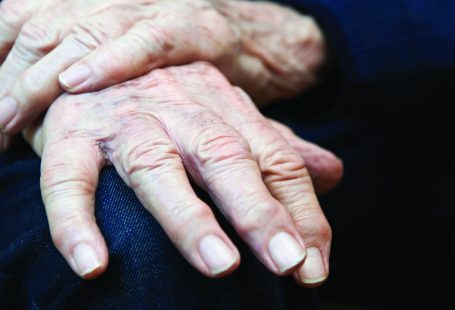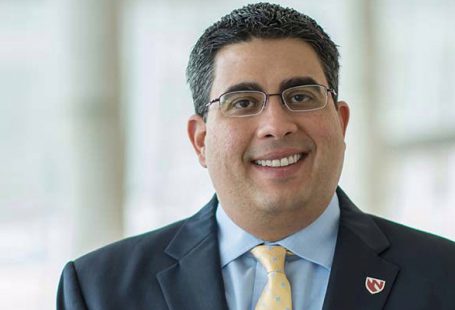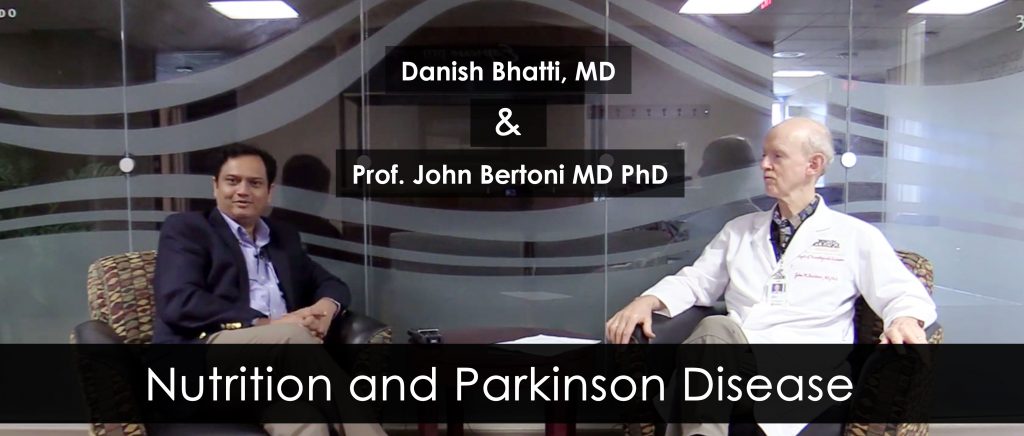
Welcome. My name is Danish Bhatti. I’m an assistant professor in the Department of Neurological Sciences at University of Nebraska Medical Center, and I have the pleasure of having Professor John Bertoni MD PHD, the Director for Parkinson’s Disease Program, with us today to discuss an important topic about nutrition and Parkinson’s disease.
John Bertoni: Well, yes, we are co directors of the Parkinson’s Disease Clinic now. So it’s a pleasure working with you. And as you know, we’re into some important research about nutrition and Parkinson’s disease.
Danish Bhatti: That’s right. So I have trained with you as a movement disorder fellow and I’ve been working with you for the last five years and I know that you’ve always paid attention to nutritional status and vitamins of your patient with Parkinson’s disease. And I’ve seen your patients do very well with their Parkinson’s disease for 20-30 years and still walking to clinic and coming regularly. And I’ve always tried to figure out what are those things that I can replicate and have my patients have similar outcome. So, you know, I am now working with you and we’re working together on this nutritional study of Parkinson’s disease. What would you tell us a little bit about? What is this study?
John Bertoni: This study looks specifically at the vitamin levels at patients. In our patients with Parkinson’s disease, we are working with folks at Harvard. There’s a friend of mine Walter Willett that works in the School of Public Health that’s developed a Harvard food preference questionnaire. And as you know, people with Parkinson’s disease have lost of all factions, sometimes very early and they tend to choose the wrong foods. We’re trying to specifically find what is it about their diets that’s different? What are their needs that are different from ordinary people and how we can solve those problems?

Danish Bhatti: So since when have you known Ward Willett?
John Bertoni: Actually we go back to medical school days. He was a year my senior at University of Michigan Medical Center and I’ve kept up with him and found out what he’s been doing from time to time. And he’s developed a fantastic worldwide translated into many different languages food preference questionnaire. There are people that suffer from wet berry berry and other conditions that are basically because of their diet.
Danish Bhatti: How did you find this food questionnaire to work with him and Parkinson’s patients?
John Bertoni: Actually I contacted Walt and we talked about it and he suggested that we use the questionnaire.
Danish Bhatti: So you knew Walt was doing some work in nutrition?
John Bertoni: That’s correct. And I can’t remember exactly what the first step was. But what happened was we had phone conferences and now we have decided and now we’re in barking on a study that’s IRB approved here at UNMC.
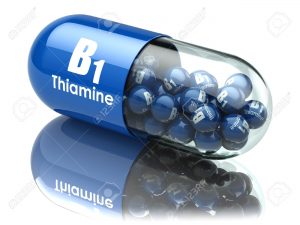 Danish Bhatti: So the study is looking at the dietary habits of Parkinson’s patients that present to our clinic and we’re measuring the vitamin levels and nutritional vitamins that are commonly low namely Vitamin B1-Thaimine, B6-Pyridoxine, B12-cyanocobalamine) and Vitamin D.
Danish Bhatti: So the study is looking at the dietary habits of Parkinson’s patients that present to our clinic and we’re measuring the vitamin levels and nutritional vitamins that are commonly low namely Vitamin B1-Thaimine, B6-Pyridoxine, B12-cyanocobalamine) and Vitamin D.
John Bertoni: That’s correct.
Danish Bhatti: And what you wanna find out about this diet and correlation with Parkinson’s?
John Bertoni: Well, first of all we wanna find out on a group of patients that presented in our comprehensive clinic. These are usually new to us but sometimes these are patients that we’ve also found out may have a nutritional problem. So everyone has to sign a consent form and is given a questionnaire and take so.
Danish Bhatti: Do you think that vitamin deficiencies may have something to do with the kind of food that take?
John Bertoni: Yes. Because for example, we go for the foods that we enjoy because of the aromas, more than I think the sweetness sour, bitter and the Japanese also Umami so we’re looking to see why patients speak differently with Parkinson’s and why they have a vitamin deficiency. So we’ve found low vitamin B1 which is really hard to be low than vitamin B1.
Danish Bhatti: Because it’s so prevalent.
John Bertoni: It’s giving you everything. It’s unhealthy food. But I just saw a woman in the emergency department a couple nights ago and asked her what she was eat. She has Parkinson’s disease. She says for breakfast I am half of a diet coke and one slice of white bread. And then she went on and the diet was like that. I mean she had a cheese sandwich in there somewhere but basically.
Danish Bhatti: no greens no vegetables no fruits.
John Bertoni: no none.
Danish Bhatti: So you think that the vitamin deficiencies is common in Parkinson’s? It is likely linked to the dietary habit of Parkinson’s patients which is probably due to changes off Parkinson’s disease in the brain.
John Bertoni: Yes. Many causes. The causes include that they lose their appetite with the medications we give them, they lose their appetite because they have constipation in their food travels slowly through their GI tract. They have less of an appetite. They don’t burn as many calories and they don’t need as much according to them. But as long as we give them the right values and find out whether it’s deficient . One of the major reasons is how do we predict when there are over 200 thousand people in the United States that are Thiamine deficient? Now is a fraction of the total. That’s not a very big part. But we want to know what is it? Is it that they have weight loss? Is that the key that we should ask the people who have lost more than five pounds and do these studies? That may be one of the outcomes we find. Another one might be that we should screen everybody at the beginning. People that have neuropathy, as you know many of these vitamin deficiencies cause neuropathy.
Danish Bhatti: Like a nerve damage.
 John Bertoni: Right. Like a B12 deficiency which is really not too rare in the elderly. They lose their ability to absorb B12. So with all of these things.
John Bertoni: Right. Like a B12 deficiency which is really not too rare in the elderly. They lose their ability to absorb B12. So with all of these things.
Danish Bhatti: So your saying that vitamins are deficient for possibly various factors including the slowness of the bowel movements – the delayed gastric emptying, loss of sense of smell with not having much aromas to provide and feel appealing. And then Dr. Ron pfifer works showing bacterial over growth in small bowel and if I think of one more thing is that some of these medications can actually reduce vitamin absorption such as carbidopa can block vitamin B6 absorption .
John Bertoni: That’s correct.
Danish Bhatti: And now with the sinemet infusion pumps (carbidopa-levodopa infusion gel) we’re finding a lot more B6 and B12 deficiency. That’s very interesting. So you think that vitamin deficiency is being caused by all these factors related to Parkinson’s but is it internally affecting that Parkinson’s disease in any way?
 John Bertoni: You know, it really does affect. When you look it does affect your illness, because when you see what the risk factors are, if they get osteoporosis from lack of vitamin D and lack of calcium in their diet, they don’t eat much dairy products. And some of them can’t really digest dairy products very well at that age. If they don’t take in enough protein, they’re going to have weaker muscles and they’re going to tend to get a neuropathy and they’re going to tend to fall more easily. And when they fall, they’re more likely to have a fracture. So these things will then put people in the hospital and in the hospital, they’re given so many medications, there’s medications to wake them up in the morning and medications put things to sleep at night and medications to calm them down which may make the problems worse.
John Bertoni: You know, it really does affect. When you look it does affect your illness, because when you see what the risk factors are, if they get osteoporosis from lack of vitamin D and lack of calcium in their diet, they don’t eat much dairy products. And some of them can’t really digest dairy products very well at that age. If they don’t take in enough protein, they’re going to have weaker muscles and they’re going to tend to get a neuropathy and they’re going to tend to fall more easily. And when they fall, they’re more likely to have a fracture. So these things will then put people in the hospital and in the hospital, they’re given so many medications, there’s medications to wake them up in the morning and medications put things to sleep at night and medications to calm them down which may make the problems worse.
Danish Bhatti: Do you think you know one other thing that comes obviously to mind is some vitamin deficiencies can cause problem with balance. Yeah poor balance and postural instability with risk of falls and with the weak bones and osteoporosis that you mentioned. But do you think Parkinson’s disease progressed differently in people who have a good diet a bad diet due to nutrition or other factors of vitamins?
John Bertoni: You know I have hunches. Well that’s why we do studies. I do think that the choice of the foods that you eat every day make a big difference in how tough, how strong, how capable you’re going to be mentally and physically. And if you eat right and if people find you get vitamin deficiency and get replaced, you’re much better off. If you only have two hips and if you break one of them, you’re bedridden and some people took it out of nursing homes. They end up ending their life. So this is an important thing. Yes, I do think that we can intervene the real question is for the people most likely to suffer from vitamin deficiencies. How do we recognize them and how do we make sure that their quality of life is optimal?
Danish Bhatti: It’s interesting. We have discussed about some of the literature that came out in last couple of years and we’ve shared articles with each other. We have seen reports that in a large community, if you look at vitamin D level on Parkinson’s patients, the ones with low vitamin D level seems to have a faster progressed vitamin Parkinson’s or worse of Parkinson’s disease. We have also seen similar reports about vitamin B12. I sent you a paper when you know Mormons in mice. They gave very high doses of vitamin B12. One active form of B12 which has four active forms. And it showed that they were more resistant to developing Parkinson’s disease like damage in the brain from the chemicals we used to create Parkinson’s Mormons in mice. So that was very interesting. And then we have seen similar reports for Thiamine. So it sounds like that maybe some support now for a hunch about vitamin deficiency as being important for Parkinson’s disease. So if you does anything more about that and do you think there are more things beyond vitamin deficiencies about diet in Parkinson’s.
 John Bertoni: Well we have vitamins alphabetically and you know there are many B vitamins? If we think we have found all the vitamins all the essential nutrients we’re fooling ourselves because there are more and more iron for example is often low in people with a very very poor diet. And if they have GI distress then that’s another reason for them to become weak. So I don’t think we’re done discovering nutrients. We need to find out what are the causes of the low nutrients and we need to fix it. Yes, there are G.I. We’re outnumbered 100 to 1. What we have inside a G.I. tract.
John Bertoni: Well we have vitamins alphabetically and you know there are many B vitamins? If we think we have found all the vitamins all the essential nutrients we’re fooling ourselves because there are more and more iron for example is often low in people with a very very poor diet. And if they have GI distress then that’s another reason for them to become weak. So I don’t think we’re done discovering nutrients. We need to find out what are the causes of the low nutrients and we need to fix it. Yes, there are G.I. We’re outnumbered 100 to 1. What we have inside a G.I. tract.
Danish Bhatti: You mean the bacteria the germs in our gut.
John Bertoni: If you go down every one of those bacteria and every cell in our body all our muscles all our brain cells, nerve cells, every world numbered 100 to 1. So we don’t want to be a democracy. So we have to make sure that some of these organisms actually take out the important ingredients in sinemet or carbidopa levodopa. They minimize the effectiveness of the medications we give. Some of them also make it difficult for B12 to be absorbed. So there’s many many different interplay’s between what we eat and what it does.
Danish Bhatti: Right. Thats true and it’s all about constipation and bowel movement and we know if that is slow gastric emptying that can affect the absorption of medicines that the patients take and make the response to medication less predictable more. So good seems to be a very important center in management of Parkinson’s disease and might even mean progression of Parkinson’s disease. What do you think about these ideas that it may also have a central role in onset of Parkinson’s disease or beginning?
John Bertoni: Well like you said Ron Pfifer who is one of the big leaders in the Parkinson’s Study Group and one of his things is to look at the G.I. tract and what is going on with that as a cause of Parkinson’s because sometimes bacteria can get in for other particles can get into our bloodstream and into our bodies into our brains and there is a hypothesis as you know that there is a nerve that controls the GI tract called the vagus nerve. It means wandering nerve because it was so long. When that becomes affected, it affects the brain stem just above the spinal cord before the brain. We think with and then it progressively moves up to the palms and to the mid brain. And in the mid brain it causes Parkinson’s disease. That’s where Parkinson’s disease can start. And then the whole faction is lost in the early process. And then if it progresses into the entire brain, then we have a dementia and Lewy body dementia which is a form of Parkinson’s disease. But you know some examples I can tell you about are remarkable. You would think that positions of all people. We did not get into vitamin deficiencies and as we talked about before, we have three or four cases of physicians and nurse practitioners that have Parkinson’s disease that have come into our comprehensive clinic and were amazed how low their vitamin B1 are.
Danish Bhatti: So tell me about a specific case. Let’s focus on a patient. How it can affect their life. Tell me about a case where you are really impressed by the importance of nutrition in vitamin deficiency in Parkinson’s.
John Bertoni: My neighbor years ago behind in our backyard was a retired physician and I noticed he had a very mild form of what we had to call Parkinsonism. We didn’t see much in the way of tremor but there was a slowness. But a lot of older people get sore. So I was just watching him in the clinic and not making a firm diagnosis and he was interested. But I think he knew he was getting Parkinson’s. He was smart enough guy. So eventually he would come to our symposium where we had hundreds and lately about a thousand people coming to learn the latest about how you get Parkinson’s disease and what you do about it. And then it became clear this really was Parkinson’s disease in that patient. So he started to have a tremor. He was bradykinetic and he had all the features and we started to record things. I checked his vitamin levels and he needed vitamin B12. So I finally convinced him you know physicians can be difficult patients, let’s admit it. So because we think we know too, we do know too much and sometimes that gets in the way. So anyway, I said, you have to take me twelve shots. Then the time came when he missed an appointment.
Danish Bhatti: Ok. so he was coming regular.
John Bertoni: Coming regularly. So the last visit I checked his cognition and he was slipping and I said we need to do some testing to see what things you’re good at, what things we call them neuroscientists. He refused. So next thing I knew, I want to see my eye doctor. And he asked me junior doctor so and so.
Danish Bhatti: This is after a gap of certain time since you’ve last seen him.
John Bertoni: Right. Because he didn’t come. He didn’t. So finally he said, do you know him? And I said, yes. Yeah. Yes. your Ophthalmologist, yes he said (your ophthalmologist was also his ophthalmologist).yes, yes A common doctor and he said you know Dr. So and so. and I said yes. Yes he was my neighbor and a really good guy. And why do you ask? And he said he’s not doing very well. So I finally got him on the phone and I said you must come in (your older neighbour). So I had to lean on him a little. So and his wife tried to get him to come in. And he sometimes would sometimes wouldn’t. But the situation is we’re going to take a break.
Danish Bhatti: So this was after a gap of how much time.
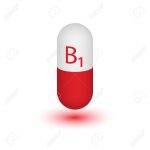
John Bertoni: It might have been a year here in Atlanta. So what I did was I haven’t come in and they said we’re going to test your vitamins. And his vitamin B12 was really low.
Danish Bhatti: How was he when he came back after that year and a half of a gap?
John Bertoni: His mini mental status had deteriorated even further.
Danish Bhatti: So he was worse cognitively.
John Bertoni: Worse cognitive. Physically he was quite a bit worse. And we do a score. We put him through the tests and you know.
Danish Bhatti: Was he taking any medications by them or he was prescribing anything?
John Bertoni: He was not taking them regularly. So he was a typical maybe I think he just was forgetful more. And who knows? But maybe he doubted that he really needed it. Or maybe he felt like he was.
Danish Bhatti: or he was forgetting to take them.
John Bertoni: Right. I found that he was not if you have to have a 180 or 200 as bottom line or minimum and even at 250 we tell people to take day more. His number was 72. And I called him up and I said you’re taking shots right. He says oh no I quit taking notes.
 Danish Bhatti: He was on B12 shots because you earlier found him on a mild deficiency of B12 and recommended B12 injections.
Danish Bhatti: He was on B12 shots because you earlier found him on a mild deficiency of B12 and recommended B12 injections.
John Bertoni: Because he wasn’t getting enough or wasn’t taking the vitamin B12 .
Danish Bhatti: and its 72 that in itself can cause dementia.
John Bertoni: Yes, it can. And so it sort of it feeds on itself. If you’re not remembering to take it, then you’re going to get more and more dementia. So this is what happens to people and the Thiamine level. It’s very hard to get low with thiamine level. There are some conditions where some situations like congestive heart failure, some of those patients really do have a vitamin deficiency and it may be time. So anyway, his vitamin B1 was extremely low. So as the B6 in this vitamin D3 was well. Everything we checked.
Danish Bhatti: Was he losing weight?
John Bertoni: He was losing weight. He was not eating. He was now using a walker. His wife was honestly getting burned out because he would just not listen, not do it. Part of that I think it was the dementia itself. So there is an example of number one somebody who should know better. But you know we have what’s called the human condition. Even if we know we should do something, we don’t always do it. And so I got him back on all these medications and he was back in the normal range.
Danish Bhatti: This is giving me a dramatic example, but a very clear example highlighting how nutrition can adversely affect you much more so than just the disease itself just the Parkinson’s. And maybe your Parkinson’s can get worse or cognition gets worse. So you know it’s interesting that we check by a man’s nutritional vitamins routinely in our patients. And I was a little surprised a few days ago when we met this professor visiting from California who said he does not check vitamins on his patients at all unless he see a clinical sign of a deficiency which we know are so weak and so hard to pick. And we find one routine screening very often vitamin deficiency. So it makes me wonder you know I have a couple of questions. 1. What makes you convinced that it’s a good practice clinical practice to check these vitamins? You know, it’s not a guideline or a recommendation from anywhere. 2. How often do you find these vitamin deficiencies and did that make you be more convinced that you should do more often?
John Bertoni: That’s a really good question. It goes back to a patient that we have discussed before that had a short gut syndrome. And she was labeled a spinal cerebellum degeneration. I couldn’t figure out which one. I studied.
Danish Bhatti: That’s way back when you were right in your first year of neurology resident.
John Bertoni: Yes. And everybody told me she there was nothing wrong was clear. And I said there’s nobody in the family that has this. A lot of these are familial. And I said I’ve even so we worked with. I just decided to do a lot of studies. She was deficient because of no small bowel that had to be taken out when she was an infant, that she couldn’t absorb any fat sizeable mammals. So and she was also her B12 was normal but her vitamin A, vitamin D, vitamin E and vitamin K were all the fat soluble vitamins. So this was the first adult case and she developed a problem like during her high school graduation. And she then I saw in her 30s and we solve these problems and her visual acuity got better her vision. She had a narrow field of vision and we showed that it did expand with treatment which is. So that was very.
Danish Bhatti: So very early on and got an evidence that vitamins are important and nutritions is a big role neurological disorders. With Parkinson’s when did you start getting that similar hunch or ideas?
John Bertoni: If I think I have been having a high index of suspicion for this. When somebody comes in with a neuropathy and you know me, I check up on everybody. And when somebody has more difficulty with Gate or has a fall, I check them again. And if there’s any doubt I have an EMG done, we identify with the causes and solvent. So a lot of times it’s things like diabetes that can cause a neuropathy. But if we don’t manage the diabetes and the patient also has Parkinson’s disease, they’re going to fall. They’re going to break a hip, they’re going to be bedridden. Their quality of life is going to go down.
Danish Bhatti: So now when you do routine vitamins levels B1 B12 D. How often do you find them low without any clinical evidence?
John Bertoni: You just part of the reason we’re doing this study, because I remember the ones that are really really low and I feel so glad that we checked because we probably preventive means.
Danish Bhatti: You have to make a guess here 5% 10%.
John Bertoni: And I’m thinking this when we’re like 10 percent and in like in my reading you wonder there are people that are now saying there is a connection with B12 deficiency. Some people say vitamin D. Of course we get a lot of vitamin D from the sun and where we are. The sun is low. A lot of the here. And we don’t go outside because we can get cancer. We get melanoma from being out in the sun with Parkinson’s. So we have to get the right amount. So I would say about 10 percent if we include iron deficiency. I have found people with severe iron deficiency. It is good to pick that up also because sometimes there’s a very early G.I. kind of neoplasm that if it’s small just starting, you can get all of it into the bucket as we say by an operation or even a biopsy on a colonoscopy.
Danish Bhatti: Well. just to complete the list, the other one that I often do and I think we would do in balance problem is zinc level and actually find a lot of zinc deficiency which is not supposed to be very common but surprisingly in our patient population they are. And so I want to circle back where we started. Where are we now with the Howard food questionnaire in nutritional study and Parkinson’s and how many patients you have, What kind of data you have? And what are your next steps with this study?
John Bertoni: Well, I have reviewed the most remarkable cases and we’re beginning to write case reports now. There are three or four such patients that are illustrative of why we need to check. We now have with the Harvard food questionnaire, I believe about 150 people that have volunteered to be in the study. And what they do is they take a one time questionnaire. We analyze their vitamins and nutrition and we collect it. We as you know in our comprehensive clinic, we have occupational and physical therapy, speech therapy and swallowing at the same time. We have a nutritionist. We have a social worker. We do the whole thing. And there’s nurse case managers which is she’s the point person our whole system. So we’re going to go to 200. And we’ve already had one of the master’s students that our nutritionist is working with collect the early samples. But I don’t think we have all the results of the food questionnaires yet.
Danish Bhatti: The food questionnaires wouldn’t be analyzed and then we would be correlated with Parkinson’s disease. So better writing presentation.
John Bertoni: Right. Because I think we’re going to find that they go for the salty and the sweet foods and nothing nutritious foods. But that’s why we do a study because it’s a hunch until we prove it.
Danish Bhatti: Wonderful. That was great. Thank you.



